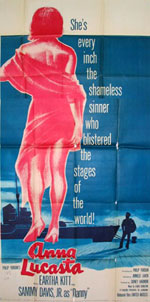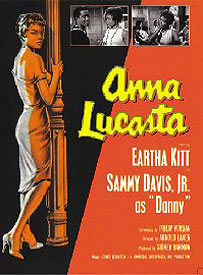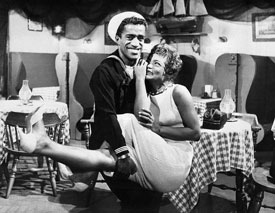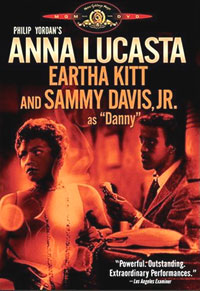 Adapted by the author from the 1944 play by Philip Yordan, Anna Lucasta (1958) stars a massively appealing Eartha Kitt. It's a pulp-fiction poetic script about a tough, beautiful, wild young woman of the bar scene. As pulp fiction it's like something by Eugene O'Neill filtered through Cornell Woolrich, which is a very good thing.
Adapted by the author from the 1944 play by Philip Yordan, Anna Lucasta (1958) stars a massively appealing Eartha Kitt. It's a pulp-fiction poetic script about a tough, beautiful, wild young woman of the bar scene. As pulp fiction it's like something by Eugene O'Neill filtered through Cornell Woolrich, which is a very good thing.
Danny Johnson (Sammy Davis Jr.) is a sailor who likes Anna a lot, though Danny's a bit of a wastrel, & it's his friend Lester (Charles Swain) who seems to express something purer toward Anna.
Joe Lucasta (the tremednously talented Rex Ingram) is her old father of a small town middleclass household somewhere in California. He turned his back on his wayward daughter & forced the rest of her family to do likewise.
Theresa Lucasta (Georgia Burke), Joe's wife, loves Anna so much, & wants her back even if she did become a streetwalker. Anna needs a new chance to get her life straight, & Theresa wants to help, hoping to arrange for Anna's marriage to Rudolf Slocum (Henry Scott), who is coming west from the deep south in search of a wife.
Joe doesn't want her back in the house. She'd been his favorite daughter as a child & thus his disappointment is heightened. He's not a man without troubles of his own, however, & one of the great dramatic moments of the film is when he overcomes his deepset anger & sets out for San Diego to bring Anna home.
 Rudolf turns out to be a decent college-educated chap, so harder to take advantage of than Theresa may have hoped, & not at all apt to have a naive view of Anna. Nevertheless, he's instantly smitten. Rudolf turns out to be a decent college-educated chap, so harder to take advantage of than Theresa may have hoped, & not at all apt to have a naive view of Anna. Nevertheless, he's instantly smitten.
He has $4,000 to start life out west with a new wife. Some of the family just wants to cheat him of it if they can. When he falls for Anna it all seems too good to be true. But old Joe gets kind of weird about it, & there's an alarming undercurrent of Joe's love for his daughter having been a little more twisted than healthy from the start.
On the wedding day for Rudolf & Anna, Joe lurks about like a weirdo, raising the suspense that something's going to go seriously wrong. And he flips out all righty, turning out to be a seriously mentally ill old man.
Anna descends into partying drunken decadence when Danny shows up. He's a devil-may-care guy eager to encourage Anna's worst behavior, & her self-hate has convinced her she cannot be good for Rudolf. But in a script that refuses to embrace stereotypes, Danny begins to worry about her making bad choices, revealing his sensitive side when he realizes she's crashing into an emotional pit.
Joe's death bed hallucinations has Anna as a little schoolgirl coming to visit him, a very tragic moment. Sad as it is, even so, Joe's death might actually mean Anna will have a chance at life after all.
 One of the last great American film noirs, sometimes feeling like a French film of harsh realism, Anna Lucasta deserves ever recognition as a masterwork. Such little touches as the end-credits triptyche of the cast done as etchings indicate a work of art was intended, & for my tastes was achieved.
One of the last great American film noirs, sometimes feeling like a French film of harsh realism, Anna Lucasta deserves ever recognition as a masterwork. Such little touches as the end-credits triptyche of the cast done as etchings indicate a work of art was intended, & for my tastes was achieved.
If it has not been widely recognized as such it's likely because it was, in its day, thought of as mostly a gimmick to let black actors play straightforward dramatic roles, & was not taken as serioiusly as these artists justifiably took themselves.
Black cast films were past their heyday & had never been taken serioiusly by mainstream critics. Anna Lucasta had also been filmed once before, in 1944, with a white cast, who made it seem only melodramatic.
And of course, Eartha Kitt's career went in the dumpster for a long while after the Johnson administration blackballed her in a post-McCarthy Era example of McCarthyism, when she had the audacity as to opose the Vietnam War. To this day she has not received the due she merits for capturing the complexity of Anna's life.
copyright © by Paghat the Ratgirl
|

